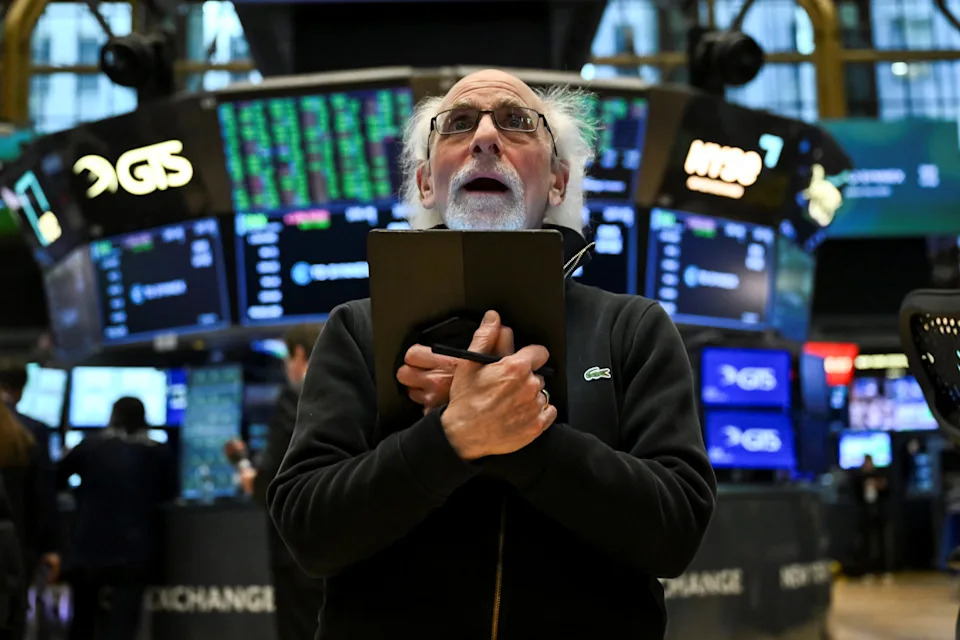The pause heard 'round the world of investing.
The S&P 500 ( ^GSPC ) exploded 9.5% on Wednesday as President Trump announced a 90-day pause on reciprocal tariffs for most countries. He cranked up the pressure on China, however, taking tariffs up to 125% . The tech-heavy Nasdaq Composite ( ^IXIC ) surged 12% for its second-best day on record. The Dow Jones Industrial Average ( ^DJI ) shot up 7.8%, or about 3,000 points.
Only nine stocks in the S&P 500 closed the session in the red, led by slight drops in consumer plays Dollar General ( DG ), of 1.9%, and Kroger ( KR ), 0.8%. Popular momentum stocks such as Tesla ( TSLA ) and Nvidia ( NVDA ) roared back to life with respective gains of 22% and 18%.
Markets are likely to remain volatile as a 10% baseline tariff is still in place. Trump could reverse his stance anytime, and companies like Delta ( DAL ) and Walmart ( WMT ) continue to warn about the negative effects of the 2025 trade war.
To that end, all three major stock indexes were down about 2% each in premarket trading on Thursday.
The tariffs sparked a wave of activity among the Wall Street strategist community, which has spent the past week warning about deep recessions and slashing price targets.
Read more: How to protect your money during economic turmoil, stock market volatility
Earlier on Wednesday, Goldman Sachs chief economist Jan Hatzius said a US recession was now his base case after lifting his recession probability forecast on Monday to 45%.
By the close of trading, with markets in tariff pause rally mode, Hatzius reversed his stance and said a recession was no longer the base case.
"Certainly investor confidence and the predictability of policy in the US has gone down, maybe not permanently, but certainly for the short term. So we're not going back to where we were a week or even three months ago," Gabelli Funds co-chief investment officer of value Chris Marangi said on Yahoo Finance's Market Domination .

Here is what Wall Street is saying about the Trump tariff 90-day pause.
TD Securities head of Global Macro Strategy James Rossiter
"We believe the impact on the US remains significant, and that the Fed will cut meaningfully this year (with a first cut in June, but with a degree of uncertainty). Inflation is likely to rise toward 4%, the unemployment rate toward 5%, and the chance of a recession remains around 50%."
Citi retail analyst Steven Zaccone
"In our view, the news offers some relief to negative tariff sentiment on retail stocks, but China at 125% is still a significant problem for product cost inflation, price increases required to offset, and negative earnings impact for several retailers."
Jones Trading chief market technician Mike O'Rourke
"The President’s tactical retreat today was a clear positive. Nevertheless, this is no way to manage an economy. It is fair to say an artificial worst case scenario has been eliminated, but the financial markets have been swinging trillions of dollars intraday on the whim of one individual.
"What remains to be seen is whether this is truly a tactical retreat or really capitulation in disguise. If it is a tactical retreat, investors have three months of trade and tariff headlines driving swings in the equity market. Capitulation in disguise would be marked by exemptions for larger companies, leaving an individual in the position of picking winners and losers in the business world. Either way, investors should be discounting a larger equity risk premium into the market."
JPMorgan economist Michael Feroli
"The drag from trade policy is likely to be somewhat less than before, and thus the prospect of a recession is a closer call. However, we still think a contraction in real activity later this year is more likely than not. Even with the China share of imports falling to trivial levels, the increase in tariffs represents a tax increase of over $300 billion since Inauguration Day. Moreover, the policy-setting environment remains unfriendly to planning for capital spending. With the next red-letter date for trade policy not until just after Independence Day, we now think the Fed will have even more incentive to wait longer for policy uncertainties to be resolved, hopefully, and now see the next cut at the September meeting (June previously). We still see the top of the funds rate target range getting down to 3.0% by 2Q26."
Brian Sozzi is Yahoo Finance's Executive Editor. Follow Sozzi on X @BrianSozzi , Instagram , and LinkedIn
